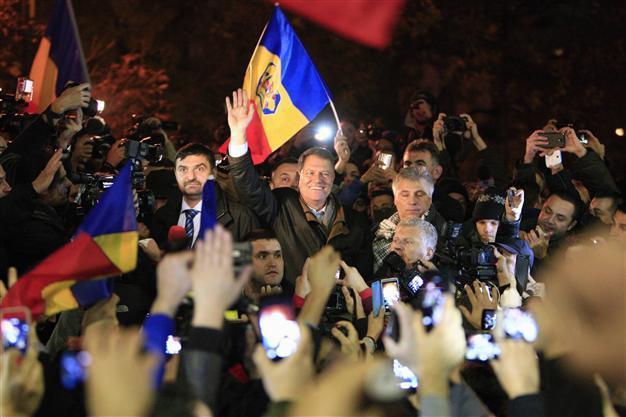Romania's anti-graft mayor wins shock presidential victory
buchare

Romanian presidential candidate Klaus Iohannis (C) waves as he celebrates his victory in the election run-off, with protesters in central Bucharest November 16, 2014. REUTERS Photo
An ethnic German mayor of a medieval Transylvanian city pulled off a shock victory in Romania's presidential elections, defeating the premier after vowing to stamp out corruption in the graft-riddled country, early results showed on Nov. 17.Klaus Iohannis, a soft-spoken former physics teacher known for avoiding conflict, secured an overwhelming 54 percent of the votes cast in Sunday's poll, according to partial results, soundly beating Prime Minister Victor Ponta.
The election was seen as pivotal for one of the poorest countries in Europe that has struggled to overcome an entrenched culture of corruption.
Exit polls had put the two candidates neck-in-neck after Sunday's election, but did not take into account the votes cast by the large Romanian diaspora, which was seen as more likely to vote to Iohannis.
"We've won!" Iohannis wrote on his Facebook page.
Ponta conceded defeat, saying "I congratulated Mr Iohannis on his victory. The people are always right."
Partial results showed that a record 64 percent of voters cast ballots in the poll in a country where previous ballots have been marked by voter apathy. Official results are expected to be announced later on Monday.
Ponta, 42, had hoped to become Romania's youngest ever president and cement his Social Democrat party's hold on power in the former communist state.
In the first round on November 2, he took 40 percent of the vote against 30 percent for Iohannis.
But 46 percent of the ballots cast abroad were for Iohannis compared to just 16 percent for Ponta, who was so confident of victory he said he planned to watch the results at home eating popcorn in the front of the television.
Experts had earlier said that a high turnout in the second round could well tilt the balance in Iohannis's favour.
"The vote has been phenomenal. The turnout was huge," said Iohannis, the centre-right mayor of the Transylvanian city of Sibiu, who comes from the country's ethnic German community that was persecuted under the country's communist dictator Nicolae Ceaucescu.
Iohannis, who faced accusations of not being a "real Romanian", campaigned on an anti-corruption platform, vowing to turn Romania into a "normal" country.
Observers say he appealed to voters with his reliability and honesty in a country sick of government corruption, with several senior figures in Ponta's formerly communist Social Democrats accused of graft.
Rodica Avram, a 56-year-old teacher, said after casting her ballot in Bucharest that she had voted for change.
"For the past 25 years we have heard nothing but lies and promises that weren't kept," she said. "I hope we'll finally have a president who respects people and does what he promises."
Ponta's main support base came from the hugely influential Romanian Orthodox Church, as well as his party's traditional electorate of the rural population, small business employees and the elderly.
Ahead of the vote experts said Romania's diaspora, which numbers about three million, could play a key role in swinging the result.
Only 160,000 were able to cast their ballots in the first round due to an insufficient number of polling stations in countries including France, Germany and Britain.
On Sunday, long queues of people snaked outside polling stations in Paris, London and several other cities including the southern English town of Portsmouth, according to pictures shown on Romanian television.
In the evening, thousands were still waiting to vote in some European cities, sparking renewed anger at the way the vote has been organised.
At the Romanian embassy in Paris police used tear gas to disperse hundreds of would-be voters who said they had not been able to cast their ballot.
In Bucharest, several thousand people took to the streets in solidarity with expatriates they said were being "prevented from voting".
Despite progress in reforming the justice system -- which has even seen a former minister jailed for corruption -- many were fearful of a backlash if Ponta became president.
On what was dubbed "Black Tuesday" in December last year, Ponta's government passed a series of new laws granting immunity to elected officials.
The changes were ultimately blocked, but Ponta's critics said the episode served as a wake-up call.
















